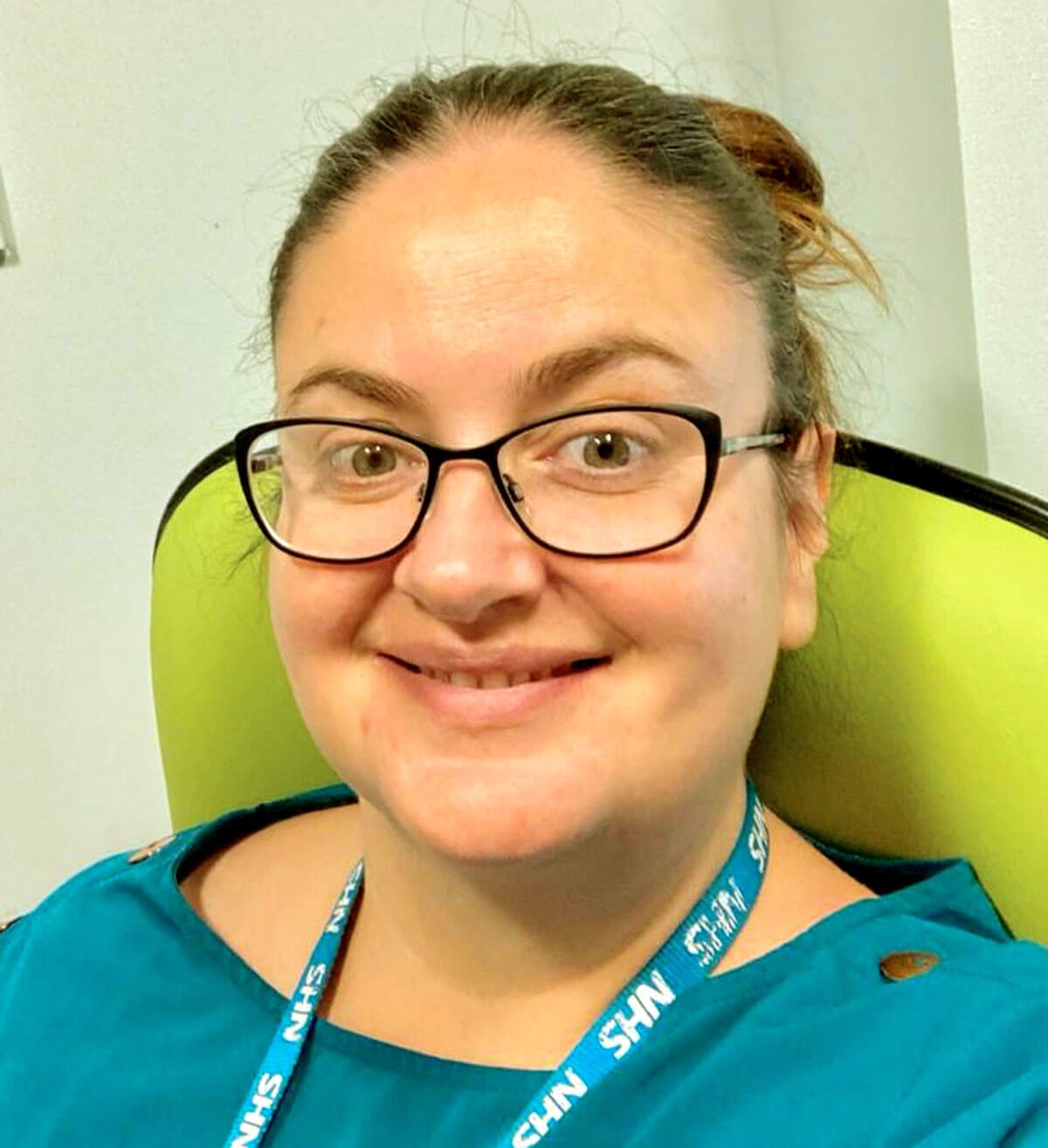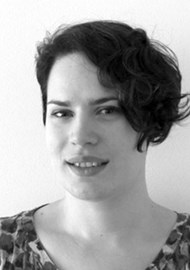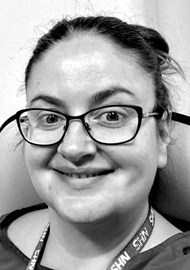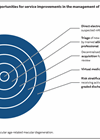Rosalyn Painter spoke to Clare Abbott, a member of the Eye Clinic Liaison Officer (ECLO) team at Oxford Eye Hospital, about her day-to-day job as an ECLO, how the role can help patients, and the ongoing importance of their work.

How long have you been an ECLO, and can you give us a little background into what you did before becoming an ECLO?
I have been an ECLO now for just over three years. Originally, I am a trained nurse with a specialist practitioner qualification in district nursing. I left nursing nearly 10 years ago now. After having my children, I wanted to come back to the NHS but wasn’t sure that a nursing job was for me. After a long search for a job which I felt would be a good fit for me, I came across the ECLO position. After a lot of reading and investigation into the role, I decided it would be right for me, I applied, and I guess the rest is history!
What is the purpose of an ECLO?
I think the number one purpose of the ECLO is patient advocacy. ECLOs help people at lots of different stages in their eyecare journey from temporary help and support to helping patients with life-changing sight loss. Sight loss is often a scary, traumatic, and life-altering circumstance for anyone to have to navigate. ECLOs can help patients navigate that journey and help them get access to the right avenues of help and support.
How do you meet your patients?
Our patients are registered here at Oxford Eye Hospital. Typically, they have first been seen and assessed by a doctor, or another specialist eyecare professional. If needed, they are then referred to us. Most often, we meet them in clinic. We are a drop-in service so we can be available for any patients who may need to see us unexpectedly. However, there is such a growing demand for our service, we find we get referrals from multiple avenues, from optometrists to GPs to occupational therapists to self-referrals from the patients themselves. We also work closely with the county council’s visual impairment services who refer patients to us.
How can other ophthalmic professionals refer to their ECLO?
We are easy to reach! We are lucky to have a dedicated room to call and see patients, so everyone knows where we are. We normally have our door open if we don’t have a patient with us and we encourage other professionals to come and find us there. Otherwise, they can call us or send us an email.
Is there anything that would make your work life easier?
More ECLOs! We know that we are not capturing all the patients we could. In an ideal world we would have administration support. The role is very admin heavy, and another part-time ECLO to help cope with the growing demand would also help us stretch into developing the role further in our trust.
Why is it so important that ECLOs are based within the hospital rather than in the community?
I think there is room to have ECLOs in both settings. Right now, patient assessments and diagnoses happen in secondary care settings and therefore to make sure our patients are seen, treated and have access to the best help and advice at the point of diagnosis, ECLOs need to be there too.However, as technology moves on, and as more and more patients are seen by ophthalmologists in peripheral and community based clinics, I think there would be a case for ECLOs in the community too.
Can optometrists outside the hospital refer to their local hospital ECLO?
They can, if the patient has been seen in the hospital relatively recently and we have a diagnosis for them. However, if the patient has not been seen for over a year by us, we would normally suggest the patient is referred to us for clinical assessment first. Sometimes the more appropriate route can be for the patient to be referred to the Optometry Low Vision service who would then refer on to us if appropriate. If the patient has never been seen in the Oxford Eye Hospital, they need to be referred in for assessment by their GP or community optometrist.
How closely do you work with the local sight charities and the Royal National Institute of Blind People (RNIB)?
Quite closely! I feel very lucky that in Oxfordshire we are blessed with a thriving sight loss charitable community. Our local charity My Vision Oxfordshire is a wonderfully supportive resource for our patients. In terms of real-time practical advice for living with sight loss, they can’t be beaten! The RNIB continue to be a much-needed resource for sight loss. They have a wide range of services available to anyone suffering with sight loss and we refer our patients to them regularly. Other groups such as Blind Veterans and the Macular Society do such important work for our patients, many would be lost without the help they provide.
What kind of support can a patient expect from their ECLO?
We are here for our patients as much or as little as they want. We are here to listen to worries and fears. We are a shoulder to cry on and a listening ear. Essentially, we are a bridge between the care and treatment they receive in hospital and the plethora of help and support available for sight loss in the community. Perhaps one of the most common jobs we do is to help patients register their sight loss with their local council. This helps them get access to benefits and help and support from their local council. But we can also help them with schooling issues or help them to talk with employers about workplace-related issues. We will speak to anyone who is struggling with any degree of sight loss and help them in any way we can.
What networks do you use as ECLOs, and how do you organise this?
We are trained for this role by the RNIB. They have pioneered the role and continue to supply CPD courses and a network for ECLOs across the country. If we have particular issues or problems we cannot solve, we can submit questions to the network and there is always an ECLO who has come across it before and can lend a swift answer or advice. We also get regular updates from the RNIB regarding regulations / benefits / available support etc.
Are you able to meet regularly with other ECLO colleagues?
Unfortunately, as we are such a niche profession, there is only a handful of ECLOs within reach of Oxfordshire which makes meeting up with them tricky. COVID-19 has also brought with it another layer of difficulty with face-to-face meetings, as we have not been able to attend any in-person training or seminars usually run by the RNIB. I am very hopeful these will resume soon.
What misconceptions do you come across in your role?
Not many misconceptions as such, the main barrier is letting patients and staff know we are here. We have put a lot of work in to letting our presence known and speaking to different specialties about what we do and the support we provide. As a small service, it is a constant challenge. We still hear patients saying that they wish they’d known we were here years ago. However, we have a lot of support for the role amongst the staff and patients in the eye hospital and from the councils visual impairment service.
COMMENTS ARE WELCOME








